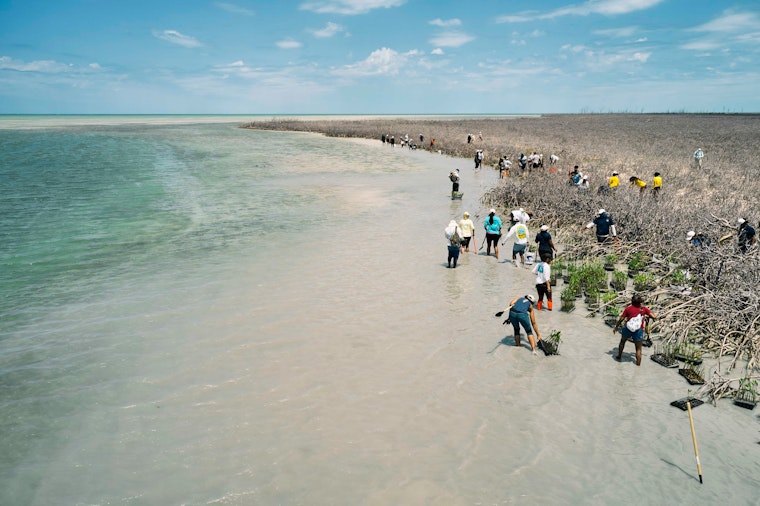How an Outdated Law in the Bahamas Protects Corporations from Environmental Lawsuits—and What Can Be Done About It
By Juliana Vengoechea Barrios and Auro Fraser

More than a decade ago, activists in the Bahamas went to the courts in the hopes of halting a heavy fuel oil power plant. Although the case against the Bahamas Energy Corporation (BEC) was unsuccessful in stopping construction, the plaintiffs—various community groups incorporated under the name Responsible Development for Abaco (RDA)—nevertheless succeeded in obtaining a ruling from the court of appeal recognizing their right to participate and be consulted by public authorities when it came to decisions affecting their interests. Activists also believe that the legal proceedings were also the reason the BEC eventually changed the plant’s fuel from Bunker C oil to diesel oil, the first which is highly toxic when dissolved in water and exposed to sunshine.
But as the environmental movement in the Bahamas has gained steam, RDA’s ability to bring forward legal challenges has been at risk of being blocked because of their inability to pay substantial upfront costs required for the case to be heard by the courts. These costs are orders from the court for plaintiffs to pay upfront securities for the legal costs of their opponents (referred to by the courts as “security for costs”)—even when the defendants are corporations with much deeper pockets.
In practice, such punitive sums prevent grassroots organizations from “[having] their day in court”, as emphasized by RDA’s lawyer. For this reason, and in the interest of protecting constitutional rights and advancing the interests of the public, the practice is being phased out across courts in the Caribbean and Commonwealth jurisdictions including the United Kingdom, Kenya, and Canada. But laws in the Bahamas continue to lag international standards.
When, in 2016, community groups came together again as RDA to challenge the development of a private marina for Abaco Club resort at Winding Bay, which would have threatened the coastal environment, they were ordered by courts to provide a sum of $250,000 for security for costs. This occurred again in 2020 when local communities brought a legal challenge against an exploratory offshore oil drilling license obtained by Bahamas Petroleum Company (BPC), granted prematurely without adequate environmental protections in place. The applicants had 30 days to fundraise and secure $200,000 just to bring their case forward.
The 2016 case is ongoing, unlike the case brought forward against the BPC, which failed to find commercially viable reserves, and whose exploratory licenses have since expired. After the RDA appealed the security for costs order before the Privy Council, the highest court for The Bahamas, the Justice Initiative submitted a brief arguing that courts must remove security for costs as a financial barrier that prevents such public interest cases from being heard. In February 2023, the Privy Council ruled that RDA would not have to pay the security for costs for the developer, noting that “[an] order requiring a claimant to provide security for a developer’s costs… risks deterring the claimant from proceeding with its claim and hence is an impediment to gaining access to court.”
When it came to the security costs order for the government, the Privy Council also stated that the amount the plaintiffs were ordered to pay was “very high for what was a very simple judicial review claim” and remarked on the lack of adequate reasoning the lower level judge provided for the order for security for costs.
Why does this court case development matter?
Access to justice in areas like the Bahamas is a new frontier in environmental justice and climate activism. Even though leading scientists have continued to emphasize the urgent need to end the exploitation of fossil fuels, various economic factors have meant that, even though the Bahamas doesn’t currently have a drilling industry, the Caribbean remains a priority area for aggressive oil exploration by foreign oil corporations. The participation of citizens in decision-making by governments that have a direct impact on the environment, and having means to seek redress to any harm, is a primary concern.
One company, Challenger Energy, estimates 700 million to 1.44 billion barrels of oil could be present underneath the sea floor of the Bahamas—which, critics warn that if drilled, could destroy the fishing and tourism sectors.
Considering this potential for new drilling, how the courts of the Bahamas approach security for costs will impact the future of environmental justice in the country, the ability of communities to protect and conserve their natural and cultural heritage, and the oil and gas industry writ large.
Continuing to impose punitive financial barriers that bar communities from accessing courts will pave the way for deep-pocketed private interests to determine the future of The Bahamas—to the detriment of its inhabitants and the planet. To ensure that this doesn’t happen, the Bahamas should not only take the most recent decision of the Privy Council as a new standard to assess security for costs orders, but also go further and consider it as an impetus to change its laws and protect the right of access to courts.
Juliana Vengoechea Barrios is a managing legal officer with the Open Society Justice Initiative’s litigation team.
Auro Fraser is the regional coordinator for the Caribbean at the Open Society Foundations, focused on advancing climate justice, economic justice, human rights, and gender equality.